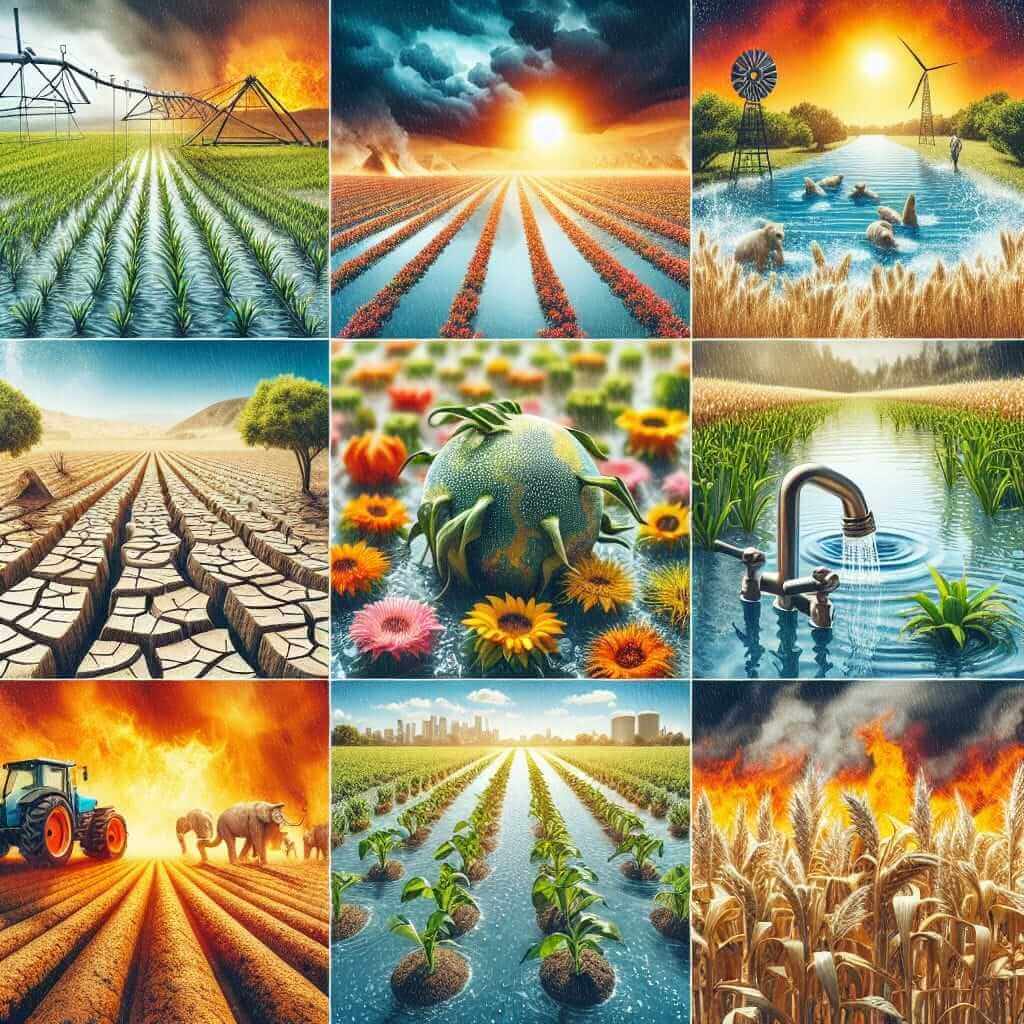The Reading section of the IELTS exam tests your ability to understand and interpret written English. This section includes a variety of question types, and the topics can range from natural science to humanities. One recurring theme is climate change due to its global significance and applicability to various academic disciplines. Understanding “What are the effects of climate change on global food production systems?” is critical, as this topic has appeared frequently in the past and is likely to feature in future exams due to its timely relevance.
Reading Passage
Title: The Impacts of Climate Change on Global Food Production
In recent decades, climate change has become a pressing issue that affects numerous aspects of our world, including global food production systems. Agricultural productivity, water resources, and food security are significantly impacted as climatic conditions continue to shift. This article explores these effects and the adaptive strategies employed to mitigate them.
Agricultural productivity is arguably the most direct effect of climate change on food production systems. Rising temperatures, altered precipitation patterns, and increased frequency of extreme weather events such as droughts and floods all contribute to fluctuations in crop yields. For instance, major staple crops like wheat, rice, and corn have shown varying levels of sensitivity to these changes, resulting in reduced yields in some areas and increased yields in others.
 Climate Change Impact on Agriculture
Climate Change Impact on Agriculture
Moreover, water resources essential for agriculture are under severe strain due to climate change. Changes in precipitation patterns can lead to water scarcity or excessive water availability, both of which pose challenges to farming practices. Flooding can destroy crops, whereas droughts can limit water supply for irrigation, compromising crop growth and sustainability.
Food security is also threatened by the effects of climate change on food production systems. Reduced agricultural productivity can lead to shortages, thereby increasing food prices. This, in turn, affects the accessibility and affordability of food for vulnerable populations. The interplay between water scarcity, reduced yields, and food security highlights the complexity of the issue.
To combat these threats, various adaptive strategies are being considered and implemented across different regions. These include the development of drought-resistant crop varieties, improved irrigation techniques, and advancements in technology to predict and mitigate the effects of extreme weather events. These adaptive measures are crucial for ensuring that global food production remains resilient despite the challenges posed by climate change.
Questions
Multiple Choice
-
What is the most direct effect of climate change on food production systems?
a) Increased food prices
b) Water scarcity
c) Agricultural productivity
d) Food security -
Which of the following crops are mentioned as being sensitive to climatic changes?
a) Soybean
b) Oats
c) Wheat, rice, and corn
d) Barley, rye, and tea -
What are the main adaptive strategies mentioned for mitigating the effects of climate change on food production?
a) Urban farming and organic farming
b) Drought-resistant crops and improved irrigation techniques
c) Reducing food waste and improving transport networks
d) None of the above
True/False/Not Given
- Flooding can both destroy crops and significantly improve yields. (True/False/Not Given)
- Reduced agricultural productivity rarely leads to increased food prices. (True/False/Not Given)
- The development of drought-resistant crop varieties is one adaptive strategy to combat the effects of climate change. (True/False/Not Given)
Answer Keys and Explanations
- c) Agricultural productivity
- Explanation: The passage identifies agricultural productivity as the most direct effect of climate change on food production systems.
- c) Wheat, rice, and corn
- Explanation: These crops are explicitly mentioned in the text as being sensitive to climatic changes.
- b) Drought-resistant crops and improved irrigation techniques
- Explanation: These adaptive strategies are listed in the passage as measures to mitigate the effects of climate change.
- False
- Explanation: The passage indicates that flooding generally destroys crops rather than improves yields.
- False
- Explanation: The passage implies that reduced agricultural productivity typically leads to increased food prices.
- True
- Explanation: The development of drought-resistant crop varieties is explicitly mentioned as an adaptive strategy.
Common Mistakes
Common Mistakes in This Type of Reading Passage
- Misinterpreting Details: Students often confuse the direct effects of climate change with its subsequent impacts, such as food security vs. agricultural productivity.
- Skipping Keywords: Missing out on keywords like “drought-resistant” or “adaptive strategies” can lead to incorrect answers.
- Assuming Information: Many students assume information that is not provided, which can be particularly troublesome in True/False/Not Given questions.
Vocabulary
Vocabulary List
- Agricultural productivity (noun): /ˌæɡrɪˌkʌlʧərəl prɒdʌkˈtɪvɪti/ – The output of agricultural processes.
- Precipitation (noun): /prɪˌsɪpɪˈteɪʃən/ – Any form of water that falls from clouds and reaches the ground.
- Resilient (adjective): /rɪˈzɪliənt/ – Able to withstand or recover quickly from difficult conditions.
- Vulnerable (adjective): /ˈvʌlnərəbl/ – Exposed to the possibility of being attacked or harmed.
- Irrigation (noun): /ˌɪrɪˈɡeɪʃən/ – The supply of water to land or crops to help growth.
Grammar
Important Grammar Points
- Complex Sentences: “As climatic conditions continue to shift, agricultural productivity, water resources, and food security are significantly impacted.”
- Example: Because climate change affects precipitation patterns, water resources are under severe strain.
- Passive Voice: “Agricultural productivity is arguably the most direct effect of climate change.”
- Example: Flooding can be caused by an increase in extreme weather events.
Advice for High Scores in IELTS Reading
- Practice Regularly: Consistent practice with a variety of reading materials will improve your understanding and speed.
- Expand Vocabulary: A broad vocabulary will help you understand passages and answer questions more accurately.
- Understand Question Types: Familiarize yourself with different IELTS question types and practice them to develop strategies.
By paying close attention to key details, improving vocabulary, and regularly practicing different reading question types, you can enhance your chances of achieving a high score in the IELTS Reading section.


